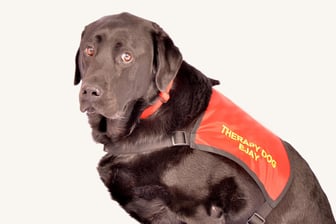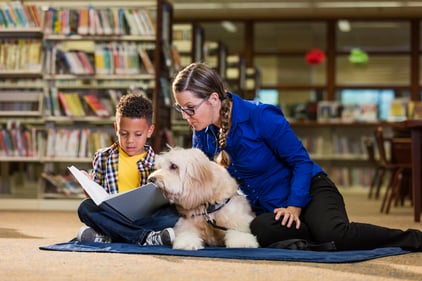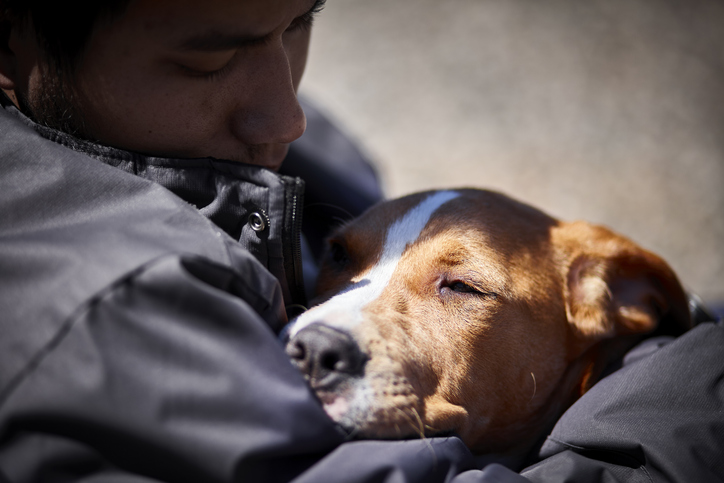Service Dogs and Therapy Dogs for Autistic Children
There can be many benefits to having a service or therapy dog, such as an autism assistance dog, for autistic children. The following article provides information to help you decide if a dog is right for your autistic child.
What is a service dog?
Service animals are animals that are specially trained to help individuals with disabilities. Service dogs are trained specifically for the person that they will work with and may help someone with disabilities relating to mobility, sight, hearing, epilepsy/seizures, diabetes, anxiety, or developmental disorders. When service dogs are in “working mode,” or assisting their owner, they typically wear a harness that says “SERVICE DOG” so bystanders know not to interact with the dog. Service dogs are allowed in all public places.
What is a therapy dog?

Therapy dogs are trained to provide affection and comfort. They may be part of hospitals, schools, mental health facilities, or live with a family. Therapy dogs can help with physical or occupational therapy or act as a calming animal in stressful situations. Most therapy dogs receive formal training, but not all do. Like service dogs, they also wear a harness that identifies them as working therapy dogs. Unlike service dogs, therapy dogs do not always have access to public settings, such as a grocery store.
How are the dogs trained?
All service dogs are extensively trained. Training programs begin soon after the puppy is born, focusing on socialization, obedience, and distractions. The dogs are not ready to join families until they are typically 18-24 months old. After family interviews and assessing the specific needs of the individual who would own the dog, the organization helps the family find the perfect dog match.
How could a service or therapy dog help my child?
For an autistic child, a service dog can decrease anxiety during daily activities and increase their safety. Service dogs can be trained to recognize and stop behavior that can harm the child, such as self-harming. A service dog may be trained to intervene and block the child from hurting themselves. Service dogs can also be trained to understand boundaries and alert others when a child begins wandering, leaving the home, or crossing a street unattended. Additionally, the dog can be trained to recognize emotional episodes, such as a tantrum, and learn to lay over or against the child as a calming physical support.
Service or therapy dogs can also create opportunities for socialization; children can learn to connect with others by introducing their animal to another person or may feel more comfortable approaching others walking dogs.
Owning a dog is also an opportunity for responsibility. Children can learn to feed, clean, and care for their new animal!
When should I consider a service or therapy dog for my child?
 It’s important to consider how your child interacts with animals.
It’s important to consider how your child interacts with animals.
- Have they previously been around dogs?
- Are they comfortable interacting with dogs?
- Is your family prepared to care for an animal?
- Is your home an appropriate setting to raise a dog?
- Are you prepared to care for a dog in health and sickness?
You may also want to consider a “companion dog,” a dog that is not raised for service, but rather as a family pet, and can also be of great benefit to your autistic child.
What are the costs?
The cost of getting a service dog is approximately $20,000 on average. Service dogs are not covered by insurance, so typically fundraising is done to afford the animals. Like any pet, there will also be feeding, cleaning, and veterinary costs. Some families can successfully raise funds on sites like GoFundMe.com.
Places to get a therapy dog
It’s important to get a service animal from a legitimate, certified place. That way you know that your dog has been specifically trained to cater to your specific needs. The place should require information or a letter of recommendation directly from your doctor. The service dog seller should verify the person’s specific disability/needs and openly discuss the dog’s specific training with the buyer. A “scam” seller may only ask for a deposit/money, not concerned about the needs of the buyer. Here are a few verified service dog training companies:
-
4 Paws for Ability
- 4 Paws was the first agency in the United States to begin placing task-trained Autism Assistance Dogs and the first agency known to place these assistance dogs with tracking skills.
-
Autism Service Dogs of America
- This organization trains service dogs to provide physical safety and an emotional anchor for autistic children.
-
Custom Canines Service Dog Academy
- Custom Canines Service Dog Academy is a nonprofit organization of volunteer professionals and individuals who embrace the endeavor of creating and supporting lasting partnerships between highly skilled service dogs and the community of mankind with diverse disabilities and impairments, thus greatly enhancing their quality of life.
-
Blessings Unleashed
- Their mission is to enrich the lives of autistic individuals by training and placing highly skilled service dogs.
-
Assistance Dogs International
- Assistance Dogs International, Inc. (ADI) is a worldwide coalition of non-profit programs that train and place Assistance Dogs. Founded in 1986 from a group of seven small programs, ADI has become the leading authority in the Assistance Dog industry.
What else should I know?

Like any living being, dogs age. As they become older, service animals may become physically weaker, develop issues with mobility, sight, or hearing, and their attentiveness may weaken. Many service dogs face “retirement” as they grow older, being unable to keep up in the way they used to.
Service dogs can help support socialization, accessibility, and safety for autistic children. If your child experiences anxiety, wandering, or self-harm behaviors such as hitting their head, a service dog may help aid in reducing the severity of these behaviors. A therapy dog can also act as a wonderful addition to your child’s life and can provide a sense of comfort and safety.
This article is based on the following sources:
https://www.autismspeaks.org/expert-opinion/service-dog-or-therapy-dog-which-best-child-autism
https://asatonline.org/for-parents/becoming-a-savvy-consumer/autism-service-dogs/
https://www.pawswithacause.org/what-we-do/assistance-dogs/service-dogs-for-children-with-autism/
https://www.autismspeaks.org/assistance-dog-information
https://www.autismspeaks.org/expert-opinion/service-dog-or-therapy-dog-which-best-child-autism
https://www.autismspeaks.org/assistance-dog-information
https://adata.org/faq/how-can-i-tell-if-animal-really-service-animal-and-not-just-pet





